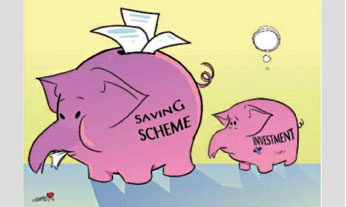The government has formed a nine-member permanent committee to review and re-fix the interest rates on savings instruments twice in a year to tighten the galloping borrowing from the costly instruments as their skyrocketing sales put a dent on the economy.
April and October are the months fixed for revisions to be conducted by the committee, a senior official of the finance ministry said.
The finance ministry will announce new rates for savings tools in January and October of each year, an office order of the ministry said.
The order, issued last week, said the prime objective of the committee is to recommend new rates for savings tools comparing those with the current bank interest rates.
The committee will assess the fiscal implications caused by the mad rush for high-yielding savings tools, consider the revenue income, non-development expenditure and cash reserve portfolio of the government while proposing revision.
The trend of the government’s borrowing from the schemes, commission expenditure and beneficiaries of the tools are the guiding fundamentals of the committee, the office order said.
Headed by an additional secretary of the finance division of the finance ministry, representatives from Bangladesh Bank and National Board of Revenue have been included in the committee.
The latest decision of the government came as borrowing from the savings tools in last fiscal year more than doubled the target set by the government for the fiscal year—it stood at Tk 33,688.6 crore—the highest in the country’s history, against the target of Tk 15,000 crore.
‘We will soon hold meeting to assess the entire gravity of the soaring debt burden of the government due to enhanced investment of individuals in different savings certificates,’ a senior finance ministry official said. ‘I am in favour of slashing the rates.’
Earlier, the International Monetary Fund suggested the government to stop selling the instruments as they involve higher rates of interest, and raises debt burden for the economy.
Officials in the finance ministry said the dip in bank interest rates caused the spike in sales of savings certificates abnormally, as savers and small investors have no alternative areas to invest amid continuous stock market plummeting.
The government in May last year slashed deposit rates on savings instruments by up to two percentage points to reduce its non-bank borrowing.
The interest rate on the five-year family savings certificates was brought down to 11.52 per cent from 13.45 per cent, the five-year pensioner savings schemes saw its interest rate slashed to 11.76 per cent from 13.19 per cent, the rate on the three-year post office savings certificates was down to 11.28 per cent from 13.24 per cent and for Bangladesh Savings Certificates, the rate was re-fixed at 11.28 per cent from 13.19 per cent.
The current rates that have been in place since May last year could be slashed by two to three per cent further, a finance official hinted.
The current 2016-17 fiscal year has a target to borrow Tk 19,610 crore from savings tools.
Source: New Age










